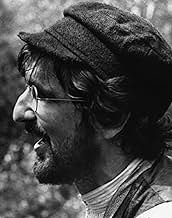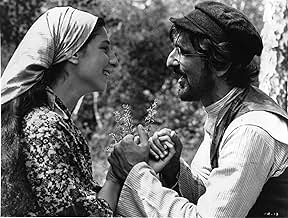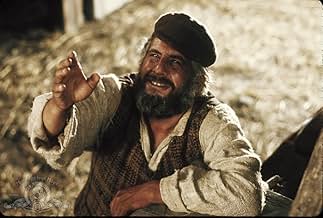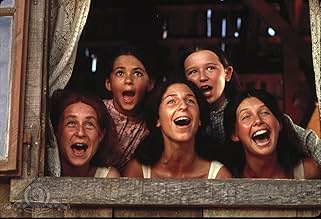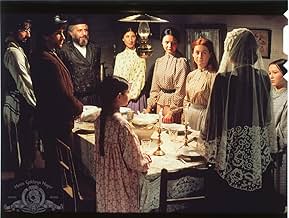In pre-revolutionary Russia, a Jewish peasant with traditional values contends with marrying off three of his daughters with modern romantic ideals while growing anti-Semitic sentiment threa... Read allIn pre-revolutionary Russia, a Jewish peasant with traditional values contends with marrying off three of his daughters with modern romantic ideals while growing anti-Semitic sentiment threatens his village.In pre-revolutionary Russia, a Jewish peasant with traditional values contends with marrying off three of his daughters with modern romantic ideals while growing anti-Semitic sentiment threatens his village.
- Won 3 Oscars
- 10 wins & 14 nominations total
Paul Michael Glaser
- Perchik
- (as Michael Glaser)
Ray Lovelock
- Fyedka
- (as Raymond Lovelock)
Featured reviews
In pre-revolutionary Russia, a poor Jewish peasant (Topol) must contend with marrying off his three daughters while antisemitic sentiment threatens his home.
Let me say this right of the bat: while this film may focus on a Jewish family and their struggle to enter the modern world (which may be good or bad), you certainly do not need to be Jewish to enjoy it. I always felt like this film (and "Yentl") were marketed towards the Jewish community, but it need not be. It is just a great story with excellent songs.
I loved the singing, the dancing, the story, the humor, the characters... there was really nothing I disliked about it. I was a bit surprised the eldest daughter was not Barbra Streisand, because they look identical. But, oh well. And I am also a bit surprised that the director was not Jewish, especially with a name like Jewison... but hey, he did a marvelous job!
Let me say this right of the bat: while this film may focus on a Jewish family and their struggle to enter the modern world (which may be good or bad), you certainly do not need to be Jewish to enjoy it. I always felt like this film (and "Yentl") were marketed towards the Jewish community, but it need not be. It is just a great story with excellent songs.
I loved the singing, the dancing, the story, the humor, the characters... there was really nothing I disliked about it. I was a bit surprised the eldest daughter was not Barbra Streisand, because they look identical. But, oh well. And I am also a bit surprised that the director was not Jewish, especially with a name like Jewison... but hey, he did a marvelous job!
Epic in plot, setting and length, Fiddler on the Roof tells a surprisingly tight and focused story that has "universal" poignancy--in a nutshell, it's about trying to maintain strong cultural traditions and identity in the face of a continually changing world, partially fueled by the youth, that doesn't necessarily share the culture's values or self-assessment of worth.
The plot is based on short stories written around the turn of the 20th Century by Sholom Aleichem, who was often called the "Russian Mark Twain". Aleichem wrote a number of works based on his character Tevye the Milkman, who has seven daughters (in the film, this was pared down to five). They live in the fictional Jewish shtetl ("village", or "little town or city") of Anatevka in Tsarist Russia in the early 1900s. The stories are "slice of life" stuff. A lot of attention is paid to Tevye's daughters and their potential suitors. One of the prominent conflicts with tradition is a struggle with arranged marriages versus marriages for love, but of course, being set in pre-revolutionary Russia, there are also political changes brewing, some of which have a profound affect on Tevye's family and village.
Aleichem's Tevye stories were first turned into a Broadway musical, which began its initial run in 1964 with Zero Mostel as Tevye. Producer and director Norman Jewison, who had had success with films like In the Heat of the Night (1967) and The Thomas Crown Affair (1968), and who was experienced as a producer and director for musical-oriented televisions shows, including "Your Hit Parade" (1950) and "The Judy Garland Show" (1960), was asked around early 1970 by United Artists to helm the Fiddler on the Roof film. To their surprise, Jewison wasn't Jewish. He got the gig anyway, and in August 1970, began an arduous shoot--much of it done in a small village in Yugoslavia that refused to cooperate when it came to weather (Jewison couldn't get the snow he wanted). He ended up getting a lot of pressure because the shoot went over time and over budget--this was one of the most expensive films of its time, which was an era of economic woes for Hollywood--but of course we know it paid off in the end.
Zero Mostel was out as Tevye, and Israeli actor Chaim Topol, or just "Topol", was in, based largely on Jewison seeing him in the role of Tevye in the London stage production of Fiddler. Jewison had said that he was shooting for more realism in the film, as opposed to what he saw as a kind of campy humor in the Broadway production.
In my eyes, Jewison ended up with a bit of both approaches in his finished film, but that's all for the better. Sequences like the opening "Tradition" montage are hilarious in their juxtaposition of a grand operatic attitude and the rhythmic coordination of cleaning fish, hanging slabs of meat, and so on. Yes, a lot of Fiddler is very realistic, but it's equally humorous and surrealistic most of the time.
The realism is largely thanks to the authentic settings, the fabulous production and costume design, and of course, the superb performances. The humor is a factor of the above with that Mark Twain-ish aspect of Aleichem's stories and the fine script by Joseph Stine.
The surrealism comes largely by way of the cinematography. Some of the visual sense is reminiscent of Marc Chagall's early work and his later, nostalgic depictions of his native Russia, and in fact, the image of the fiddler on the roof comes directly from a Chagall painting. Jewison saw the fiddler as a cross between a metaphor for the Jewish spirit (and this is explained in more detail via a few lines of dialogue in the film) and an actual physical manifestation of a spirit. However we interpret the fiddler, the shots of him and his presence in the film are certainly poetic. Jewison also gives us some fabulous, surreal, wide landscape shots, such as those of agricultural fields and the beautiful "wasteland" in which the train tracks are set. There are a few scenes set on the banks of a river, overlooked by a bridge, that are reminiscent of particular Van Gogh paintings. And as a more subtle bit of surrealism, Jewison had cinematographer Oswald Morris shoot much of the film though a woman's stocking--the mesh is very clearly visible in some exterior shots. Of course, there are also a couple more surrealistic touches in the plot, my favorite being the Tevye's Dream sequence, which features traditionalist Jewish zombies in an operatic attitude.
A musical couldn't be a 10 without great music, and Fiddler on the Roof has it. The songs are a marvelous melding of traditional Russian folk melodies, with appropriate twinges of Orientalism and the expected Broadway sound, but maybe leaning a bit closer to a modern opera. From that description, you might think that the music would be a mess, but all of the songs are inventive and catchy. They are seamlessly melded with the drama, furthering the narrative as they should. The choreography is excellent and it is well shot by Jewison. And Isaac Stern's violin solos are outstanding, of course.
Fiddler on the Roof takes an investment of time--it's three hours long, but it's well worth it. It offers great drama, great music, great humor and great tragedy in a beautiful package--you'll laugh, you'll cry, you'll sing, and you just might break a leg trying to dance.
The plot is based on short stories written around the turn of the 20th Century by Sholom Aleichem, who was often called the "Russian Mark Twain". Aleichem wrote a number of works based on his character Tevye the Milkman, who has seven daughters (in the film, this was pared down to five). They live in the fictional Jewish shtetl ("village", or "little town or city") of Anatevka in Tsarist Russia in the early 1900s. The stories are "slice of life" stuff. A lot of attention is paid to Tevye's daughters and their potential suitors. One of the prominent conflicts with tradition is a struggle with arranged marriages versus marriages for love, but of course, being set in pre-revolutionary Russia, there are also political changes brewing, some of which have a profound affect on Tevye's family and village.
Aleichem's Tevye stories were first turned into a Broadway musical, which began its initial run in 1964 with Zero Mostel as Tevye. Producer and director Norman Jewison, who had had success with films like In the Heat of the Night (1967) and The Thomas Crown Affair (1968), and who was experienced as a producer and director for musical-oriented televisions shows, including "Your Hit Parade" (1950) and "The Judy Garland Show" (1960), was asked around early 1970 by United Artists to helm the Fiddler on the Roof film. To their surprise, Jewison wasn't Jewish. He got the gig anyway, and in August 1970, began an arduous shoot--much of it done in a small village in Yugoslavia that refused to cooperate when it came to weather (Jewison couldn't get the snow he wanted). He ended up getting a lot of pressure because the shoot went over time and over budget--this was one of the most expensive films of its time, which was an era of economic woes for Hollywood--but of course we know it paid off in the end.
Zero Mostel was out as Tevye, and Israeli actor Chaim Topol, or just "Topol", was in, based largely on Jewison seeing him in the role of Tevye in the London stage production of Fiddler. Jewison had said that he was shooting for more realism in the film, as opposed to what he saw as a kind of campy humor in the Broadway production.
In my eyes, Jewison ended up with a bit of both approaches in his finished film, but that's all for the better. Sequences like the opening "Tradition" montage are hilarious in their juxtaposition of a grand operatic attitude and the rhythmic coordination of cleaning fish, hanging slabs of meat, and so on. Yes, a lot of Fiddler is very realistic, but it's equally humorous and surrealistic most of the time.
The realism is largely thanks to the authentic settings, the fabulous production and costume design, and of course, the superb performances. The humor is a factor of the above with that Mark Twain-ish aspect of Aleichem's stories and the fine script by Joseph Stine.
The surrealism comes largely by way of the cinematography. Some of the visual sense is reminiscent of Marc Chagall's early work and his later, nostalgic depictions of his native Russia, and in fact, the image of the fiddler on the roof comes directly from a Chagall painting. Jewison saw the fiddler as a cross between a metaphor for the Jewish spirit (and this is explained in more detail via a few lines of dialogue in the film) and an actual physical manifestation of a spirit. However we interpret the fiddler, the shots of him and his presence in the film are certainly poetic. Jewison also gives us some fabulous, surreal, wide landscape shots, such as those of agricultural fields and the beautiful "wasteland" in which the train tracks are set. There are a few scenes set on the banks of a river, overlooked by a bridge, that are reminiscent of particular Van Gogh paintings. And as a more subtle bit of surrealism, Jewison had cinematographer Oswald Morris shoot much of the film though a woman's stocking--the mesh is very clearly visible in some exterior shots. Of course, there are also a couple more surrealistic touches in the plot, my favorite being the Tevye's Dream sequence, which features traditionalist Jewish zombies in an operatic attitude.
A musical couldn't be a 10 without great music, and Fiddler on the Roof has it. The songs are a marvelous melding of traditional Russian folk melodies, with appropriate twinges of Orientalism and the expected Broadway sound, but maybe leaning a bit closer to a modern opera. From that description, you might think that the music would be a mess, but all of the songs are inventive and catchy. They are seamlessly melded with the drama, furthering the narrative as they should. The choreography is excellent and it is well shot by Jewison. And Isaac Stern's violin solos are outstanding, of course.
Fiddler on the Roof takes an investment of time--it's three hours long, but it's well worth it. It offers great drama, great music, great humor and great tragedy in a beautiful package--you'll laugh, you'll cry, you'll sing, and you just might break a leg trying to dance.
The story took place in the village of Russia, 1904. It centered around the leading role, Tevya, who was diaryman. Tevya was a enlightened old man, he had open-minded thought and he deeply loved his three daughters. When he looked into the future of the daughters who were unmarried, he always sang the song "If I am the rich" very kindly, because he fervently expected that they got a bright future.
In the beginning, Tevya was trying to marry off Tzietel, the oldest daughter. The matchmaker found her a matcher in Lazar Wolfm the butcher. However, the butcher was much older than Tzietel, and she didn't love him. she loved a poor tailor, and they promised to each other that they would get married. At last Tevya said yes to them. Meanwhile the second child Hodel, and a poor student also fell in love soon, and they got engaged. They informed her father this and he gave them permission to be married. The poor student was arrested for demonstrating, and was sent to a distant prison, Hodel left to join there. Last, the last daughter , Chava and Fyedka fell in love. Chava told Tevya, and he was outraged, because she wanted to marry out of the faith. She got married anyway, and Tevya disowned her. Soon after that, all of the Jewish people in Anatevka got a notice to move out. And that's the end of the play. Ir's a kind of sad ending.
In the beginning, Tevya was trying to marry off Tzietel, the oldest daughter. The matchmaker found her a matcher in Lazar Wolfm the butcher. However, the butcher was much older than Tzietel, and she didn't love him. she loved a poor tailor, and they promised to each other that they would get married. At last Tevya said yes to them. Meanwhile the second child Hodel, and a poor student also fell in love soon, and they got engaged. They informed her father this and he gave them permission to be married. The poor student was arrested for demonstrating, and was sent to a distant prison, Hodel left to join there. Last, the last daughter , Chava and Fyedka fell in love. Chava told Tevya, and he was outraged, because she wanted to marry out of the faith. She got married anyway, and Tevya disowned her. Soon after that, all of the Jewish people in Anatevka got a notice to move out. And that's the end of the play. Ir's a kind of sad ending.
I LOVE this musical but I weep a little always for the Yiddish culture lost forever. The world is so much poorer.
I apologise for straying from the artistic merit to linger on the loss to Humanity
Nevertheless this film is a permanent record of the fact that we enjoyed a wondrous Yiddish culture in our midst in Europe but after a series of Pogroms culminating in the Holocaust the heart was ripped out of our culture here in Europe
The music, the humour, the humanity, gone forever from the Heart of Europa. Europe's loss
Irish Gentile
I apologise for straying from the artistic merit to linger on the loss to Humanity
Nevertheless this film is a permanent record of the fact that we enjoyed a wondrous Yiddish culture in our midst in Europe but after a series of Pogroms culminating in the Holocaust the heart was ripped out of our culture here in Europe
The music, the humour, the humanity, gone forever from the Heart of Europa. Europe's loss
Irish Gentile
10Spleen
The range and audacity of `Fiddler on the Roof' is stunning. By comparison today's musicals are timid, quaking things, terrified of frightening their audiences away however much `social relevance' bravado they may assume. This old musical is older than it looks. The film dates from 1971; the musical itself from 1963; but even then it was clear that it was the last of its kind, a delayed swan-song from the 1950s. There's sentiment, but no promise of a happy ending; humour, but not a trace of postmodern knowingness; realism, but and a willingness to indulge in fantasy, too. Musicals can't really survive without fantasy, and `Fiddler', along with `West Side Story', may very well mark the limit of just how serious it is possible to get without losing it. The songs are uniformly good. I don't know if Bock's music was usually so fitting, or if he happened to strike gold just once - not that it matters.
As for the film ... I only wish I'll get a chance to see it in a cinema, for the photography is beautiful - and it IS the photography that's doing it, since we're made to realise that neither the village nor its setting is picturesque in itself. Norman Jewison has assembled a cast not one member of which jars and makes the most of it. This film is quite long, and feels longer, but neither length nor apparent length is a liability.
As for the film ... I only wish I'll get a chance to see it in a cinema, for the photography is beautiful - and it IS the photography that's doing it, since we're made to realise that neither the village nor its setting is picturesque in itself. Norman Jewison has assembled a cast not one member of which jars and makes the most of it. This film is quite long, and feels longer, but neither length nor apparent length is a liability.
Did you know
- TriviaThe "Sunrise, Sunset" scene was not lit by electric movie lights but by hundreds of candles, by Cinematographer Ossie Morris. Years later, Norman Jewison said it was the best lit scene in any of his films.
- GoofsWhen the old man is talking to Tevye about Tzeitel, the shadow of the microphone boom is visible on the old man's shirt.
- Crazy creditsTopol and the cast sing "Tradition" without any opening credits rolling. At the end of the number, the fiddler standing on the left of the screen launches into an extensive solo while the opening credits roll on the right of the screen.
- Alternate versionsOriginally released at 181 minutes (with an intermission); later trimmed for 1979 reissue to 149 minutes.
- ConnectionsEdited into 5 Second Movies: Fiddler on the Roof (2008)
- SoundtracksTradition
(1964) (uncredited)
Music by Jerry Bock
Lyrics by Sheldon Harnick
Performed by Topol and Chorus in the pre-credits sequence
Everything New on Prime Video in July
Everything New on Prime Video in July
Your guide to all the new movies and shows streaming on Prime Video in the US this month.
- How long is Fiddler on the Roof?Powered by Alexa
- What is 'Fiddler on the Roof' about?
- Is 'Fiddler on the Roof' based on a book?
- Where is Anatevka supposed to be?
Details
- Release date
- Country of origin
- Languages
- Also known as
- Violinista en el tejado
- Filming locations
- Lekenik, Croatia(Anatevka)
- Production companies
- See more company credits at IMDbPro
Box office
- Budget
- $9,000,000 (estimated)
- Gross US & Canada
- $10,404,330
- Opening weekend US & Canada
- $1,726,942
- Nov 11, 1979
- Gross worldwide
- $10,407,890
- Runtime3 hours 1 minute
- Color
- Aspect ratio
- 2.35 : 1
Contribute to this page
Suggest an edit or add missing content







